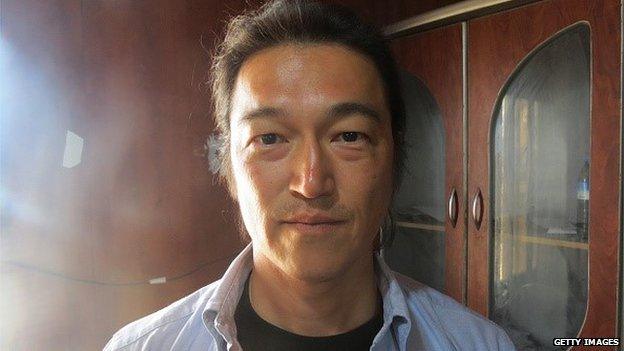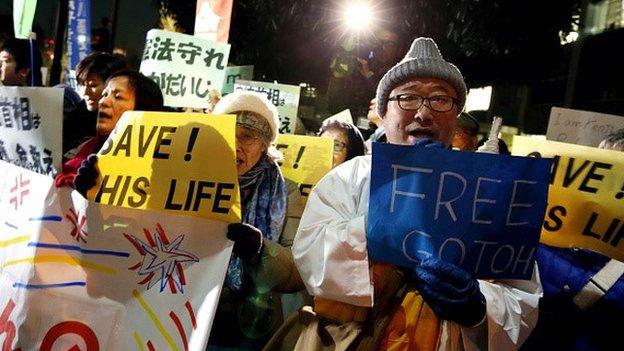Profile: Japanese journalist Kenji Goto
- Published

Kenji Goto, pictured in October 2014, said he knew he was heading to a dangerous area
Kenji Goto, the freelance journalist held by Islamic State militants, was a film-maker and veteran journalist who had striven to publicise the suffering of civilians in war zones.
On Saturday, IS released video footage which appeared to show the beheading of the 47-year-old hostage.
Mr Goto had worked in Afghanistan, Chechnya and Syria, contributing reports to Japanese public broadcaster NHK, television network TV Asahi and other outlets.
Before he went to Syria last October, he had recorded a video message, external saying he was heading to Raqqa, the headquarters of Islamic State.
"It's very dangerous so even if anything should happen to me, I won't blame the people of Syria. Whatever happens, I am responsible. But of course, I'm going to come back alive," he said.
Seeking a 'solution'
He had written books on the impact of Aids on Africa, and set up his own press agency, the Independent Press, in 1996.
In an April 2012 NHK report, external, Mr Goto met Syrian refugees in a Turkish camp, saying he wanted to report on what civilians were going through.
He spoke to women about how soldiers raided their homes, and to a former rebel soldier who brought the villagers to the refugee camp after government forces tore through their town.
In a TV Asahi report, external from Aleppo in May 2014, Mr Goto was shown riding along with volunteer rescue workers made up of former anti-government soldiers, explaining how citizens were joining these rescue groups to try and help fellow citizens in need.
In an interview with a Japanese news site, external in the same month, he said he wanted to help people in conflict areas.
"The places I visit to report face unbearable hardship, but even there people live their daily lives," he said.
"Those people always have something to say, a message they want conveyed. If I can help relay their message to the world, it might lead to a solution of some sort. If that happens, perhaps I can say my job was a 'success'."
Lost contact
The journalist was reported to have met contractor Haruna Yukawa, his fellow captive believed to have been executed by IS earlier this month, in Aleppo in April 2014, when the latter was detained by the Free Syrian Army.
Mr Goto, who had connections with the group's members, said he acted as a translator.
After Mr Yukawa's release, the two travelled together in Iraq in June, he said, as Mr Yukawa wanted to "learn how to work in a conflict zone".
When Mr Yukawa wanted to return to Syria in August, Mr Goto reportedly warned him against it. But this warning was ignored and Mr Yukawa was captured in Syria, reportedly in the summer of 2014.

Japanese protesters have appealed for Kenji Goto's captors to spare his life
Reports differ on why Mr Goto travelled from Japan to Syria in late October 2014. Some outlets said he had wanted to report on areas controlled by Islamic State.
But other outlets, such as Mainichi Shimbun and NHK, said he told those close to him that he had also intended to search for Mr Yukawa.
The most recent posts on his Twitter account were reports from the Syrian town of Kobane, an area controlled by the Islamic State, in late October.
He dropped out of contact shortly after and, weeks later, his wife received an email demanding a ransom for his release.